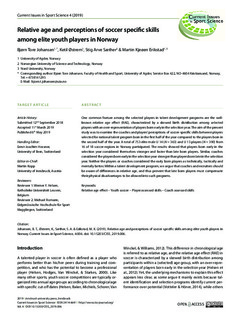Relative age and perceptions of soccer specific skills among elite youth players in Norway
Journal article, Peer reviewed
Published version
Permanent lenke
http://hdl.handle.net/11250/2632675Utgivelsesdato
2019Metadata
Vis full innførselSamlinger
Originalversjon
Johansen, B. T., Østrem, K., Sæther, S. A. & Erikstad, M. K. (2019). Relative age and perceptions of soccer specific skills among elite youth players in Norway. Current Issues in Sport Science, 4:6, 1-8. doi: 10.15203/CISS_2019.006Sammendrag
One common feature among the selected players in talent development programs are the well-known relative age effect (RAE), characterized by a skewed birth distribution among selected players with an over-representation of players born early in the selection year. The aim of the present study was to examine the coaches and players’ perceptions of soccer-specific skills between players selected for national talent program born in the first half of the year compared to the players born in the second half of the year. A total of 753 elite male U 14 (N = 363) and U 13 players (N = 390) from 16 of 18 soccer regions in Norway participated. The results showed that players born early in the selection year considered themselves stronger and faster than late born players. Similar, coaches considered the players born early in the selection year stronger than players born late in the selection year. Neither the players or coaches considered the early born players as technically, tactically and mentally better. Within a talent development program, we argue that coaches and recruiters should be aware of differences in relative age, and thus prevent that late born players must compensate their physical disadvantages to be allowed into such programs.

